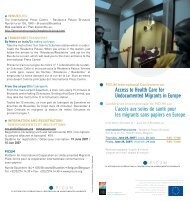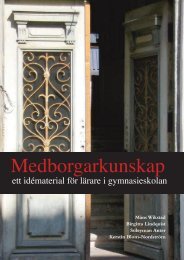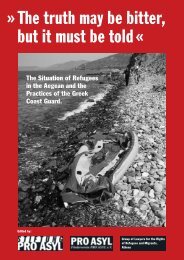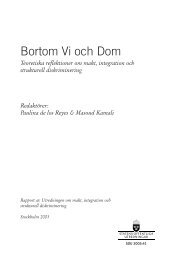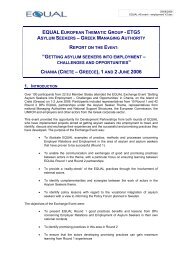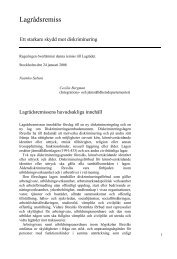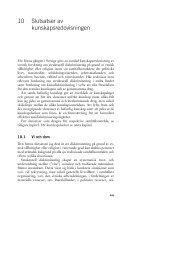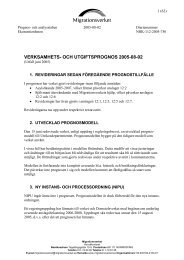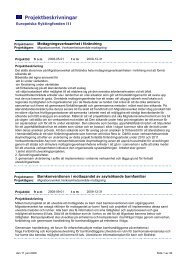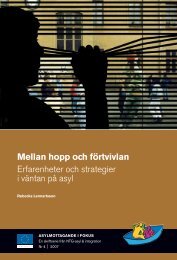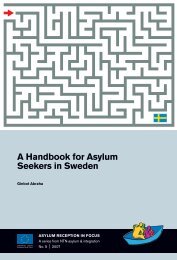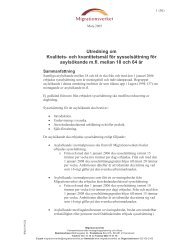The Destitution Trap Refugee Action report - Amnesty International
The Destitution Trap Refugee Action report - Amnesty International
The Destitution Trap Refugee Action report - Amnesty International
- No tags were found...
You also want an ePaper? Increase the reach of your titles
YUMPU automatically turns print PDFs into web optimized ePapers that Google loves.
<strong>The</strong><strong>Destitution</strong><strong>Trap</strong>Asylum’s untold story
03“<strong>The</strong> life I live, I findmyself depressed,abandoned, alone,a nothing.”27-year-old woman from theDemocratic Republic of Congo“At times I think itwould be better tobe dead. I was ateacher for 13 years,and here I havedone nothing. I feeldesperate. I ran awayfrom a life whichwas too dangerous,into captivity.”39-year-old man from ZimbabweVoices ofthe destitute“<strong>Destitution</strong> – itsounds as if peoplehave been put inthe bin and arescavenging. It makesme sound like ananimal. Perhapsthat is what I amnow. All I am.”67-year-old woman from Zimbabwe“Men offered meaccommodationbut they wanted sexwith me. Now I haveno food. I stayed ina church and thenwent to the policeand stayed twonights in a cell. Lastweek some peopletried to rape me…”27-year-old woman from Somalia<strong>The</strong>se are the voices of destitute asylumseekers in towns and cities across theUK. Hungry and homeless, they areliving in a kind of limbo, banned fromworking yet unable to access benefits.Many do not know where they will besleeping from one night to the next: inparks and bus stations, public toilets andphone boxes, abandoned buildings, orthe floors of friends. For survival, they relyon food parcels and the charity of others.Many are from countries torn apartby conflict, or where persecution,imprisonment and torture are widespread– countries like Zimbabwe, Somalia, Iraq,and Sudan. Terrified at the prospectof returning, they are trapped in liveswithout hope or purpose or dignity.Some sections of the press wouldhave us believe that asylum seekersare living in the UK in comfort,enjoying generous benefits. For tensof thousands of destitute people, suchheadlines carry a terrible irony.This is asylum’s untold story.
0405Backgroundto theresearch“I don’t want to stayin the UK. As soonas it changes athome I am going.But at the momentI can’t go back.”36-year-old man from the DRC“I feel that I amwaiting for nothing,stuck in a limbo,in-between. I can’twork, I can’t gohome, I can’t get anysupport. I feel as if Iam wasting my life.”36-year old man from Sudan<strong>The</strong> vast majority of asylum applicationsin the UK are turned down. In 2005, eventaking into account successful appeals, anestimated 70 per cent of applicants werefinally refused. 1 Once a refused asylumseeker has exhausted their appeal rights,financial support and accommodation iscut off and they are expected to leavethe country voluntarily or be subject toremoval. However, for a number of reasons,many do not leave but remain in the UK.As a matter of government policy, refusedasylum seekers will remain destitute unlessthey apply for a form of state supportknown as Section 4. In order to qualify forSection 4, they must first sign up to returnhome voluntarily. This applies even to thosewho cannot be returned through no faultof their own, for example, because it isunsafe, or because their country will notissue the necessary travel documents.approximately 40 per cent of requestsfor help at <strong>Refugee</strong> <strong>Action</strong> camefrom destitute asylum seekers. Ourcaseworkers are encounteringunprecedented levels of despair anddesperation among these clients.<strong>Refugee</strong> <strong>Action</strong> is concerned thatgovernment policy has created a newand growing underclass who have nocontact with the authorities, no access tomainstream support services, and littleprospect of a solution to their predicament.In the financial year 2005/06,In practice, a very small proportion ofrefused asylum seekers access Section4. At the end of June 2006, just 6,145applicants were in receipt of Section4 support. 1 <strong>The</strong> remainder of therefused asylum-seeking population aredestitute. <strong>The</strong> National Audit Officerecently estimated the backlog of refusedasylum seekers at between 155,000 and283,000. 2 But there is evidence that thenumbers could be much greater. In July2006 the BBC discovered that a trawl ofunresolved cases by the Immigration andNationality Department had producedbetween 400,000 and 450,000 files. 3In January 2006, in parallel witha study carried out in London by<strong>Amnesty</strong> <strong>International</strong>, <strong>Refugee</strong> <strong>Action</strong>commissioned national research to explorethe causes and effects of destitution. 4<strong>The</strong> research was funded by the TudorTrust and carried out by a team of fiveconsultants with extensive experiencein the field of asylum and human rights.<strong>The</strong> findings are disturbing, and raiseurgent questions about whether currentgovernment policy is sustainable.
0607<strong>The</strong>researchBetween January and July 2006, theresearch team interviewed 125 asylumseekers in Bristol, Derby, Leicester, Liverpool,Manchester, Nottingham, Portsmouth,Plymouth and Southampton. This researchwas the first in-depth survey of destitution tobe carried out on a national scale. It focusedon end-of-process asylum seekers who aredeliberately excluded from support, or themeans to support themselves, as a matter ofgovernment policy. <strong>The</strong> research was basedon an in-depth questionnaire that sought tobuild up a detailed picture of destitution.Who are destituteasylum seekers?<strong>The</strong> majority of respondents were fromcountries characterised by conflict, politicalinstability or widespread human rightsabuses. Among those interviewed, thetop five countries of origin were theDemocratic Republic of Congo, Zimbabwe,Somalia, Iraq and Sudan. Others includedIran, Eritrea, Cameroon and Uganda.Almost one in three respondents werewomen, several of whom were pregnantor had children in the UK. Most wereyoung, with 78 per cent aged between21 and 40. Some had arrived in the UK asunaccompanied asylum-seeking childrenand became destitute after turning 18.More than a third were educated tohigher education and university level.Almost two thirds of respondents did notknow what their asylum status was. Manywere diligently presenting themselvesweekly to the local immigration officein an effort not to break the law.“If I go home they willkill me, straight; theykilled my motherand my son. Betterto move about likea nomad in Englandwhere I am safeand there is noone with a gun.”49-year-old woman from RwandaSome 26 per cent were awaiting acceptanceof a fresh asylum claim. Many respondentswere legacy or backlog cases, havingarrived in the UK between 1999 and 2004.Just under half had been destitute for upto a year. Of the remainder, the majorityhad been destitute for one to two years.On average those people interviewedhad spent 21 months being destitute.Why did they come to the UK?Persecution, political instability, conflict,abuse or imprisonment were thedrivers behind the vast majority ofrespondents’ asylum applications.More than half gave accounts thatindicated persecution by the state or itsagents. A third of the women intervieweddisclosed that they had been raped. Onein ten respondents described torture.Only 12 per cent had exercised a choicein coming to the UK. <strong>The</strong> remaindersaid their destination was decided andarranged by others, usually agents.Why don’t they go home?<strong>The</strong> vast majority of those interviewedwere convinced that returning to theircountry of origin was not an option.“<strong>The</strong>y ask you to signto go back, somethingabout £3,000, a storygoing round. But if Igo back I die.”32-year-old man from the DRCNearly all believed that their personal safetywould be at risk. When asked directlywhat would happen if they did return,almost half said they believed they wouldbe killed or would “disappear”. Othersfeared they would be imprisoned or thatthey would be otherwise in danger.Many hoped to return to their countriesonce it was safe to do so. In the meantime,most were resigned to staying in the UKeven if they had no status or means ofsupporting themselves. As a result, just 15per cent of respondents were in receiptof Section 4 support. This is unsurprising,given that the government has stated thatthe intention behind Section 4 supportis to ‘convey the message of return’. 5Many respondents were from countriesto which there is in fact little prospectof facilitating either forced or voluntaryrepatriation. <strong>Refugee</strong> <strong>Action</strong> is awarethat in practice the Home Office is notreturning people to some countries,either because there is no safe and viableroute or because the relevant embassyis unable or unwilling to issue a traveldocument. For example, as of April 2006according to the <strong>International</strong> Organisationfor Migration, no Eritrean refusedasylum seekers have been able to returnvoluntarily since at least August 2004. 6
08 09When asked whythey sought asylum,78 per cent madereference to thefollowing words:“beating”“rape”“killed”“prison”“murder”“war”“abuse”“militia”“arrest”“persecution”“police”
1011A fair hearing?Experts have long expressed concernsabout the quality of government decisionmakingon asylum cases, and raised doubtsabout whether some asylum seekersreceive a full and fair hearing of their claim.Drastic cuts made recently to legal aidprovision have made it very difficult forsome asylum seekers to find a solicitorwilling or able to look at their case. Severefunding restrictions on the time allowed forlegal work on asylum cases are exacerbatedby the dispersal system. When an asylumseeker is suddenly dispersed to anotherregion of the UK, they are rarely able toremain in contact with their existing solicitor,or to find a new one, since the limit of legalfunding has often already been reached.Some 78 per cent of those we intervieweddid not feel their legal representative hadpresented their case fully and properly, and87 per cent felt they were treated unfairlyduring the asylum process. Most did nothave a legal representative at the crucialinitial stage of their application. Many<strong>report</strong>ed extremely short interviews withtheir solicitor, some as brief as 10 to 15minutes. In such a time it is scarcelypossible to take down people’s basic details,let alone prepare an asylum application.Poor standards of interpretation were alsocommon, with 50 per cent of respondentsexpressing concern with the way theirinterpreter had represented their story atfirst interview. Those who had poor initialrepresentation found that this continuedto blight their case if it went to an appeal.“I can’t go home now.I prefer to diehere, this is betterthan going backto somewherewhere I lost all myfamily and wherethey will kill me.”27-year-old man from SudanDespite this, government statistics for thesecond quarter of 2006 showed that onein four appeals were successful. Decisionmaking in relation to some nationalitieswas particularly poor. For example, 53per cent of Somali nationals and 47 percent of Eritreans who appealed had theirrefusals overturned. This raises seriousdoubts about the quality of initial decisionmaking.For every asylum seeker whosuccessfully overturns a poor decision,many more may be falling through the net. 1<strong>Refugee</strong> <strong>Action</strong> is concerned that lack ofaccess to legal provision, combined withpoor initial decision-making, are contributoryfactors leading to destitution. We fearsome applicants who could have beengranted refugee status are being refusedand are unable to properly appeal. If thishappens, an asylum seeker is left withan impossible choice: endure destitutionon the streets of Britain or return to facepersecution, torture, or even death.Even among those whose cases may nothave qualified for protection under thestrict terms of the <strong>Refugee</strong> Convention, ourresearchers were left in no doubt that thefears of most interviewees were genuine. <strong>The</strong>majority were from countries characterisedby conflict, political instability or widespreadhuman rights abuses, and their experienceshave left many with very understandablefears about the prospect of returning.“<strong>The</strong> barrister got myfile in the eveningbefore the tribunal.He didn’t know myname, hadn’t readmy case and missedso many papers. Isaw my life slippingaway throughadministrative error.”22-year-old man from SomaliaIn recent years Home Office decisionmakinghas become more stringent. UntilApril 2003 applicants who did not qualifyunder the <strong>Refugee</strong> Convention, but who theHome office felt should be given leave toremain on humanitarian or compassionategrounds, were granted ‘exceptional leaveto remain’ (ELR). In practice, ELR wasroutinely granted to certain nationalities,such as Iraqi, Afghan, and Somali.ELR has since been replaced by two newforms of limited leave, ‘humanitarianprotection’ (HP) and ‘discretionary leave’(DL), which are granted much moresparingly. In 2002 one in four initial asylumdeterminations resulted in grants of limitedleave. By 2005 this had fallen to one inten. A significant proportion of those weinterviewed would likely have qualifiedfor ELR under the old rules, but todayfind themselves refused and destitute. 7Many respondents <strong>report</strong>ed that problemswith their legal representation, as wellas their experience of the determinationprocess, had undermined their faith inthe system and left them with a senseof injustice. This in turn contributedto a distrust of Section 4 and furtherexacerbated their unwillingness to considertaking up a voluntary return package.
12 13“I don’t feel like awoman any more.I don’t feel like amother any more.I feel isolated andalone. I feel I havelost myself.”42-year-old woman from the DRC“I did something thatI’m ashamed of. Iwas so hungry thatI went into a policestation and askedthem if I could spenda night in a cell. <strong>The</strong>ysaid no as I hadnot done anythingwrong. I was sodesperate that on theway out I deliberatelysmashed a policecar headlight so thatthey would haveto arrest me. I spenta week in jail. <strong>The</strong>judge at the trial wasvery sympathetic. Iknow it was wrongto do this but I wasso desperate. <strong>The</strong>food was actuallyquite good.”Man from Zimbabwe<strong>The</strong> impact of destitutionRough sleeping was common. Sixty percent of respondents had slept on thestreet on at least one occasion, and 30per cent had done so frequently oversustained periods. Approximately onein ten were street homeless at thetime they were interviewed. Typicallocations for rough sleeping includedtents, back gardens, cars, garages, busand train stations and public parks.Most people interviewed were highlydependent on friends from their owncommunities, including other asylumseekers and refugees, for providing afloor, sofa or mattress to sleep on. Many<strong>report</strong>ed on the day of their interviewthat they did not yet know where theywould be sleeping that night. Severalpeople told of being physically attackedand verbally abused whilst sleepingrough. Many feared approaching thepolice to <strong>report</strong> such incidents for fearof being detained and deported.Most respondents were entirely dependentupon donated food and clothing tosurvive. Sources included <strong>The</strong> British RedCross, church groups and faith projects,refugee community organisations, andrefugee support organisations.An international aid worker whoseorganisation is looking at ways to helpdestitute asylum seekers in the UK told us:“Giving food to destitute asylum seekershere is not very different from handing outfood from the back of lorries in the Sudan.<strong>The</strong> humanitarian need is the same.”For many, rough sleeping, fear ofharassment, and the inability to findadequate rest and food had resulted indeteriorating health and a permanentstate of depression, distress and anxiety.Some 83 per cent of respondents hadexperienced serious health problemssince their arrival in the UK. Morethan half of those we questioned hadexperienced mental health problems.Many spoke of exhaustion, feeling letdown, and feelings of worthlessness. <strong>The</strong>ydescribed themselves as ‘hanging on’ aslong as possible, while realising that theirhealth was deteriorating and their lives,aspirations and windows of opportunitywere passing by. Many spoke of feelingsof shame and loss – of not contributingto their families and UK society, ofdisrupted education and careers, of theloss of dreams and hopes. Despairingand desperate, a large number spoke ofhaving considered taking their own lives.
14 15Is destitution'working?“Sometimes I havethought aboutsuicide. I think I mustgive up sometimes– I feel less thanhuman and havehad enough of life.”28-year-old man from Sudan“I have no status,no money and nohome. Every day Ihave to go to friendsbegging for money.Sometimes I sleep inthe mosque or spendthe whole night in thestreet. I cover myselfwith my coat.”24-year-old man from ZimbabwePresent government policy in relation to endof-processasylum seekers is demonstrablyfailing to achieve its aims. Significantly,destitution did not appear to have encouragedthose we interviewed to return to theircountries. If anything, by excluding peoplefrom the asylum system and severingcontact between refused asylum seekersand the state, it made return less likely.<strong>The</strong> lack of continuity of support involvedin Section 4 also undermines the aimsof government policy. At a time whenrefused asylum seekers need to reflect,make difficult decisions or take decisiveaction, they find themselves facing evictionand destitution. This makes them morevulnerable, and compounds their difficultiesin getting good and timely advice. It forcesthem to focus on immediate crises ratherthan on how to shape their future rationally.Asylum seekers are confused and angryabout what has happened to them. Manyhave found it impossible to understandwhy or how the system is run the wayit is, and so are deeply anxious aboutentrusting themselves to it again.<strong>The</strong> situation is exacerbated by the factthat, for many, conditions in their homecountry, the lack of safe routes availableand difficulties in obtaining the necessarydocuments mean that the possibility ofreturn in the near future is remote. Inmany cases there is a clear link betweenthese barriers to return and conflict andinstability in the country in question.At present, government policy representsa refusal to formally acknowledge the‘limbo’ status of asylum seekers from thesecountries, for which the provisions of Section4 are clearly inadequate and inappropriate.<strong>The</strong> all-party Home Affairs SelectCommittee, <strong>report</strong>ing on the welfare ofnon-returnable asylum seekers in January2004, stated: ‘Where the removal of afailed asylum seeker is delayed through nofault of his own, it is morally unacceptablefor him to be rendered destitute… It isabsurd to refuse leave to remain to peoplewho, for whatever reason, cannot beremoved. We recommend that such peoplebe granted a temporary status which willallow them to support themselves.’ 8<strong>Refugee</strong> <strong>Action</strong> believes that the use ofdestitution as an instrument of governmentpolicy is incompatible with the right not tobe subject to cruel, inhuman and degradingtreatment, as defined in Article 3 of theEuropean Convention on Human Rights.It is also inconsistent with the government’sconviction that rough sleeping is unacceptablein UK society. In December 1999, the PrimeMinister Tony Blair said: “On the eve of the21st century it’s a scandal that there arestill people sleeping rough on our streets.This is not a situation we can continue totolerate in a modern and civilised society.” 9In July 2006, the Home Secretary told theHouse of Commons that he would clear thebacklog of ‘failed’ asylum seekers withinfive years. 3 But despite the fact that morepeople are now being removed from theUK than ever before, a recent <strong>report</strong> by theCommons Public Accounts Committeewarned that it would take between ten and18 years to clear the present backlog. 10<strong>The</strong> public clearly wants an asylum systemit can trust – a system that ensures thatprotection is awarded to those who need itand, after a full and fair examination of theircase, deals effectively with those who donot. <strong>Refugee</strong> <strong>Action</strong> recognises that somemeasure of enforcement is necessaryto maintain the integrity of the asylumsystem. But a solution to this problem isimpossible to achieve by enforcement alone.<strong>Destitution</strong> is an unworkable policy that iscausing enormous suffering to vulnerablepeople and has completely failed to deliveron its objectives. <strong>The</strong>re must be a betterway, a fairer deal that will protect boththe interests of the UK and those whoseek safety here. Until such time as it ispossible for them to return, a humanesolution must be found for non-returnableasylum seekers that can allow them tobegin to rebuild their lives and regainsome sense of dignity and purpose.
16 17Ourrecommendations• No refused asylum seeker in theUK should be forced intodestitution at the end of theasylum process where appealshave been exhausted.• Grant temporary, renewableterms of leave to remain forindividuals who the Home Officehas little prospect of removing.• Refused asylum seekers shouldcontinue to be entitled to Section95 benefits until such time as theircase is resolved. <strong>The</strong>y should notbe required to apply for a separateform of support, as is currently thecase with Section 4.• Introduce a programme of backlogclearance according to specificcriteria. To re-establish contactwith the backlog of end-of-processindividuals, the government couldintroduce an incentive-basedpackage which offers thepossibility of support and a fair andhumane resolution of their case.This could include the potentialfor renewable, temporary leave toremain on the following grounds:CompassionateFor example, the length of timethe person has been in the UKand the extent to which they haveintegrated into the community.Skills-basedDiscretionary regularisation basedon the assessment of experienceand skills which might meet theneeds of the UK economy.HumanitarianRefused asylum seekers whodo not qualify for protectionunder the <strong>Refugee</strong> Conventionbut are from unstable countrieswith poor human rights records.Provisions for vulnerable groupsFor example, vulnerablewomen and people whoarrived in the UK as minors.This should take placein the context of:Legal adviceMade available to all those at theend of the process, in order toensure that their substantive claimhas been fully and fairly heardand that humanitarian protectionissues have been considered.A fair and robust returns policyAbove all, this means extendingvoluntary return packagesand assisting people to cometo terms with their situationthrough a supported caseworkerapproach (see opposite).• Introduce a positive caseworkapproach to end-of-process asylumseekers: <strong>The</strong>se measures shouldbe built into the system to preventfuture backlogs accumulating.<strong>The</strong> government’s New AsylumModel, which is based onend-to-end contact with a singlecaseworker, offers an opportunityfor end-of-process supportpackages to be embedded in thesystem. We urge the governmentto invest in a positive caseworkapproach to people at the end ofthe process, based on modelssuch as the work of the HothamMission in Melbourne, Australia.A key outcome of the Hothamapproach is a higher degreeof voluntary repatriation andcompliance with return schemes.Of the asylum seekers that theHotham Mission has workedwith in the last five years,84 per cent have returnedvoluntarily. <strong>The</strong> Hotham modelseems to offer an alternativeto forced removal by preparing,supporting and empoweringasylum seekers throughout theasylum process, increasing thelikelihood that they will complywith decisions and better copewith return or settlement. 11<strong>Refugee</strong> <strong>Action</strong> is campaigningto bring an end to the use ofdestitution as an instrument ofgovernment policy. We are urgingthe government to explore moreworkable and humane solutions.For more information or to findout how you can help, visit www.refugee-action.org.uk/campaignsSources1. Home Office (2006) Asylum Statistics: 2ndquarter 2006 United Kingdom, Home Office,London (Accessed 10.10.2006)2. National Audit Office (2005) ReturningFailed Asylum Applicants, National AuditOffice, London (Accessed 10.10.2006)3. BBC Online (19.7.06) ‘Asylum backlogcleared by 2011’ (Accessed 10.10.2006)4. <strong>Amnesty</strong> <strong>International</strong>, Down and out inLondon: the destitution of rejected asylumseekers, November 20065. J Oppenheimer (2006) NASS Stakeholders’Meeting, March 20066. <strong>International</strong> Organisation for Migration(IOM) London, letter, 5 April 20067. T Heath, R Jeffries, S Pearce (2006) Asylumstatistics United Kingdom 2005, Home Office,London (Accessed 19.10.06)8. House of Commons Select Committee onHome Affairs (2004), Second Report Session2003-4, House of Commons, London(Accessed 10.10.2006)9. BBC Online (14.11.1999) ‘Blair pledgeto reduce rough sleeping’ (Accessed 10.10.2006)10. House of Commons Select Committee onPublic Accounts (2006), Thirty-fourth ReportSession 2005-6, House of Commons, London (Accessed 10.10.2006)11. G Mitchell (2006) Hotham Mission AsylumSeeker Project Description, Hotham Mission,Melbourne (Accessed 10.10.2006)
18AcknowledgementsAbove all we want to thank the individualasylum seekers who shared their storieswith us. We hope that we have done justiceto your testimony, and that this research willcontribute to ending destitution for you andothers who come after you.In addition, there are many people who theresearchers would like to thank for their helpin making this research and <strong>report</strong> possible.Without the advice, support and practical helpoffered we would simply not have been ableto do the research or produce this <strong>report</strong>.We have listed here individuals, butwould like to extend a general thanks toall staff and volunteers from the followingorganisations who helped us with setting upthe interviews, and the research in general.We list individuals here in alphabeticalorder, according to surname.Adil Ahmad <strong>Refugee</strong> <strong>Action</strong> Leicester •Rzgar Ahmed <strong>Refugee</strong> <strong>Action</strong> Liverpool •Kerry Beech British Red Cross Society(Leicester) • Jason Bergen Oxfam •Rupert Blomfield <strong>Refugee</strong> <strong>Action</strong> Devonand Cornwall • Andi Briggs Asylum-Link,Liverpool • Freshmind Chauke <strong>Refugee</strong><strong>Action</strong> Manchester • Niall Cooper Church<strong>Action</strong> on Poverty • Richard DunstanCitizens Advice • Linda East Nottinghamand Nottinghamshire <strong>Refugee</strong> Forum •Mohamed Elsharif Sudanese CommunityAssociation of Bristol • Katie Gilkes <strong>Refugee</strong><strong>Action</strong> Plymouth • Keith Grayson <strong>Refugee</strong><strong>Action</strong> Nottingham • Sysay HabonimanaEast Manchester Community Forum • NicolaHayes • Nottingham and Nottinghamshire<strong>Refugee</strong> Forum • Bridget Higginson BritishRed Cross Society (Manchester) •Professor Bruce Ingham SOAS • AlexIvancevic <strong>Refugee</strong> <strong>Action</strong> Portsmouth •Shirley Jackson <strong>Refugee</strong> <strong>Action</strong> Portsmouth• Amanda Jones-Said East ManchesterCommunity Forum • Mualja Karahasani<strong>Refugee</strong> <strong>Action</strong> Nottingham • Ferid Kevric<strong>The</strong> Derby Bosnia-Hercegovina CommunityAssociation • Christine Knight WinchesterVisitors’ Group • Maggie Knox PortsmouthArea <strong>Refugee</strong> Support (PARS) • RayhanaMahomed <strong>Refugee</strong> <strong>Action</strong> Leicester •Renae Mann Inter-Agency Partnership• Michala Meades Revive (Manchester)• Adam Mohammed Liverpool SomaliYouth Association • Kevin Ncube Toc H •Malcolm Ngouala BRASS (Bolton) • QuerimNuredin <strong>Refugee</strong> <strong>Action</strong> Bristol • ConradNyamutata British Red Cross Society(Leicester) • Santok Odedra <strong>Refugee</strong> <strong>Action</strong>Leicester • Martin Owen SOAS • SimonParker Leicester City Library • Chris PiggottPortsmouth Area <strong>Refugee</strong> Support (PARS)• Alma Repesa <strong>Refugee</strong> <strong>Action</strong> Nottingham• Ewan Roberts Asylum-Link Liverpool • LizRoberts <strong>Refugee</strong> <strong>Action</strong> Bristol • Nigel Rose<strong>Refugee</strong> <strong>Action</strong> Manchester • CharlotteRobinson Nottingham and Nottinghamshire<strong>Refugee</strong> Forum • Jane Robinson <strong>Refugee</strong><strong>Action</strong> Plymouth • Heather Sabel Devonand Cornwall <strong>Refugee</strong> Support Council •Nina Smith <strong>Refugee</strong> <strong>Action</strong> Leicester •Amanda Soraghan <strong>Refugee</strong> <strong>Action</strong> Leicester• Cathy Stevenson British Red CrossSociety (Leicester) • Natasha Stevenson •<strong>Refugee</strong> <strong>Action</strong> Leicester • Alan ThorntonChurch <strong>Action</strong> on Poverty • Ann Watts Derby<strong>Refugee</strong> Advice Centre • Andrew WilsonNottingham and Nottinghamshire <strong>Refugee</strong>Forum • Jackie Witchell <strong>Refugee</strong> <strong>Action</strong>Liverpool • Zbigniew Wojcik Derby RacialEquality Council • Myra Woolfson Nottinghamand Nottinghamshire <strong>Refugee</strong> ForumSteering Group and Legal AdvisersIn addition to the support provided bynumerous staff at <strong>Refugee</strong> <strong>Action</strong> HeadOffice, the research was steered andadvised by the following:David BurgessImmigration solicitorKathryn CroninImmigration Law Practitioners AssociationFiona RipleyImmigration solicitorJan Shaw<strong>Amnesty</strong> <strong>International</strong>Alex HallTransparency Research Partners LtdDatabase managementWe would also like to thank Tudor Trust fortheir generous funding of this research.Art direction & designNo Days OffPhotographyClaudia Jankewww.claudiajanke.comPrinted byPage Bros Ltd
BirminghamServices available:community development<strong>The</strong> Wardlow Road CentreWardlow Road, Birmingham B7 4JHT 0121 464 3548 F 0121 464 2998BoltonServices available:Gateway Protection Programme2 Deane Walk, Bolton BL3 5DGT 01204 365334 F 01204 559042BristolServices available:asylum advice andcommunity development9 Hide Market, West StreetSt Philip’s, Bristol BS2 OBHT 0117 941 5960 F 0117 955 5036LeedsServices available: communitydevelopment and ChoicesSuite 7, Floor C, Joseph’s WellHanover Walk, Leeds LS3 1ABT 0113 244 5345 F 0113 243 5448LeicesterServices available:asylum advice, Choicesand community developmentChancery House, 7 Millstone LaneLeicester LE1 5JNT 0116 261 6200 F 0116 261 6226LiverpoolServices available: asylum adviceand community development64 Mount Pleasant, Liverpool LS3 5SDT 0151 702 6300 F 0151 709 6684London | StockwellServices available:community development240a Clapham Road, London SW9 0PZT 020 7735 5361 F 020 7587 3676London | WaterlooServices available:Head office and Choices<strong>The</strong> Old Fire Station150 Waterloo Road, London SE1 8SBT 020 7654 7700 F 020 7401 3699ManchesterServices available: asylum advice,community development and Choices4th Floor, Dale House35 Dale Street, Manchester M1 2HFT 0161 233 1200 F 0161 236 4285(casework) F 0161 233 1420 (admin)NottinghamServices available: asylum adviceand community developmentAlbion House, 3rd floor5-13 Canal St, Nottingham NG1 7EGT 0115 941 8552 F 0115 950 9980PlymouthServices available: asylum adviceand community developmentPrideaux Court, Palace StreetPlymouth PL1 2AYT 01752 235030 F 01752 268805PortsmouthServices available: asylum adviceand community developmentSuite F3/4, 2nd Floor, Venture Tower,Fratton Road, Portsmouth PO1 5DLT 02392 857 561 F 02392 857 560<strong>Refugee</strong> <strong>Action</strong> is an independent, nationalcharity working to enable refugees tobuild new lives in the UK. We providepractical emergency support for newlyarrived asylum seekers and long-termcommitment to their settlement, and weassist approximately 40,000 asylum seekerseach year. As one of the country’s leadingagencies in the field, <strong>Refugee</strong> <strong>Action</strong> has 25years’ experience in pioneering innovativework in partnership with refugees.<strong>Refugee</strong> <strong>Action</strong><strong>The</strong> Old Fire Station150 Waterloo Road, London SE1 8SBT 020 7654 7700F 020 7401 3699www.refugee-action.org.uk© <strong>Refugee</strong> <strong>Action</strong> 2006.No part of this publication may be reproduced withoutprior permission. Registered charity number 283660.Registered company number 1593454.




